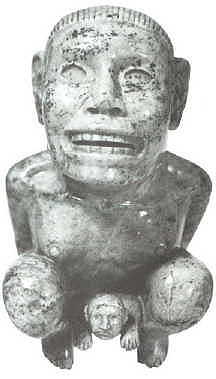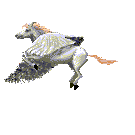The Absence of Basque
Initial Voiceless Stops
Initial Voiceless Stops
by Patrick C. Ryan
(8/22/98)



Introduction
These comments were posted to an Internet Discussion List called "Evolution of Language" (EvolutionLanguage@list.pitt.edu) during August and September of 1998 by Patrick C. Ryan in response to criticisms of the concept and content of the Basque essays entitled
In a posting to the "Evolution of Language" list dated 8/20/98, Professor Trask objects to the comparisons of Basque putz, ‘puff of air', poz(tu), ‘be joyful', puztu, ‘blow', and kako, ‘hook', in the following manner:
5. Adjectives in initial m. Here Professor Trask includes a number of nouns and adjectives "denoting physical or moral defects". An example would be matzer, ‘deformed, twisted, defective'.
We have been told on page 128, that "Probably no word beginning with m existed in Pre-Basque with this initial, apart from one or two loans from Celtic, such as mando ‘mule'." The question that might occur to some linguists reading this is how Basque, possessing no /m/ would easily borrow from Celtic a word with initial /m/? This is not the pattern we usually see, is it? Is it not very common for a sound that is present in the borrowing language to be substituted for the sound in the word of the donor langugae that that is not present in the borrowing language?
In any case, I am sure some readers like myself will find this scenario just a little unbelievable. But, to return to the classification mentioned above, then Professor Trask proceeds to tell us that these one or two of these nouns and adjectives ". . . may possibly be derived with the ancient ‘expressive' prefix ma- from other words like oker ‘twisted'".
Now, evidently, the view expressed on page 128 should be emended to read: there is no m in early Basque unless it is the initial of a word that Professor Trask considers to be ‘expressive', in which case it is permitted. So we have a language, according to him, that prohibits all m except in loanwords and ‘expressive' words. I cannot think of any other language with which I am familiar which has one sound-system for normal native words, and another sound-system for foreign loanwords and ‘expressive' words, whatever that might mean. On that basis, perhaps I will be forgiven for characterizing in my own mind this view by one of the ‘nursery words' we discussed rather exhaustively above.
6. Words with initial m which Professor Trask has not been able to fit into any other classification.
7. Phonaesthetic Words. Professor Trask explains; "By a ‘phonaesthetic' word I mean one which has apparently been coined out of thin air purely because of its appealing sound".
This is not the definition given in Professor Trask's A Dictionary of Phonetics and Phonology, where we read instead: "phonaesthesia . . . Any direct correspondence between sound and meaning . . . and such cases as Basque tximeleta ‘butterfly', whose delicate, fluttery sound appears to mimic the appearance of the insect".
To me, tximeleta suggests the sound of a fragile argument that will not break into a thousand pieces only if it is not looked at closely.
As representative of this classification, we might notice karramarro, ‘crab'. I am not sure how Professor Trask would explain what sound karramarro mimics that could pertain to the appearance of the crab but frankly, I think it is more than coincidence that Indo-European *3. kar- is the basis for words in the derived languages meaning ‘crab', and the sea in which crabs reside, is frequently connected with the Indo-European root *mori-, ‘sea', but, of course, Professor Trask will assure us that this is only a coincidence; and I guess, I should ask him, if he considers Old Indian karka-H, ‘crab', an analogous phonaesthetic creation (of recent times?) to karramarro.
We might mention, before we leave this ‘expressive' list that has suppressed much more than it has expressed, that included in this final classification is zurrumurru, ‘murmuring', which in view of "onomatopoeic" murmur, mentioned above, and zurru(nga), ‘snoring', is probably just a simple combination of the element seen in Indo-European *2. swer-, ‘hum, whir', and the element seen in mur(mur)- discussed earlier.
I trust this is rather obvious to most readers of this essay so why has this not occurred to Professor Trask to whom I nor anyone else should impute stupidity?
It may seem that I do not hold Professor Trask in high regard — but I do. Without his excellent The History of Basque, we would be forced to learn Spanish, a language of limited scholarly usefulness, in order to obtain the information contained in it.
But I honestly believe that Professor Trask (and possibly a limited number of other Vasconists) love the Basque language so arduously that they cannot bear to share it through affiliation with another language family.
In pursuit of this passion, a number of theories have been devised to keep Basque in grand isolation; and inspite of the inadequacy of the arguments supporting this false view, they have been sufficient to keep the wolves at bay because of the relatively inconvenient accessibility of Basque grammatical materials and rather limited scholarly interest in Basque.
So, I attribute to Professor Trask only a crime passionel
